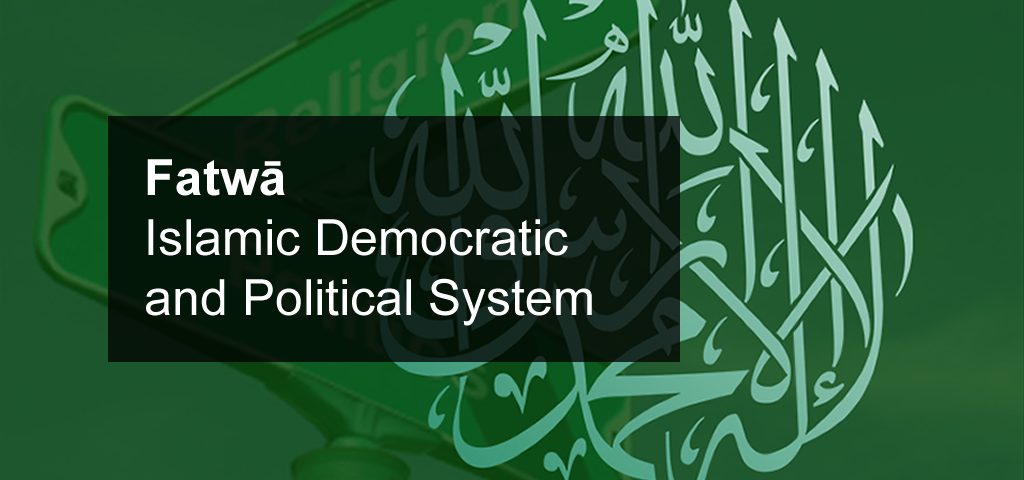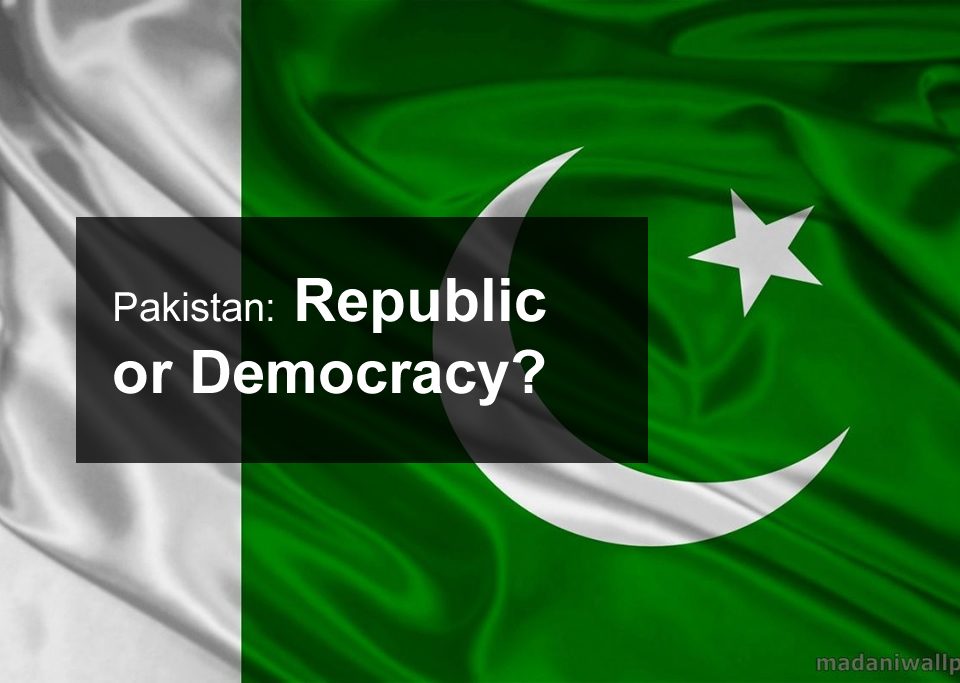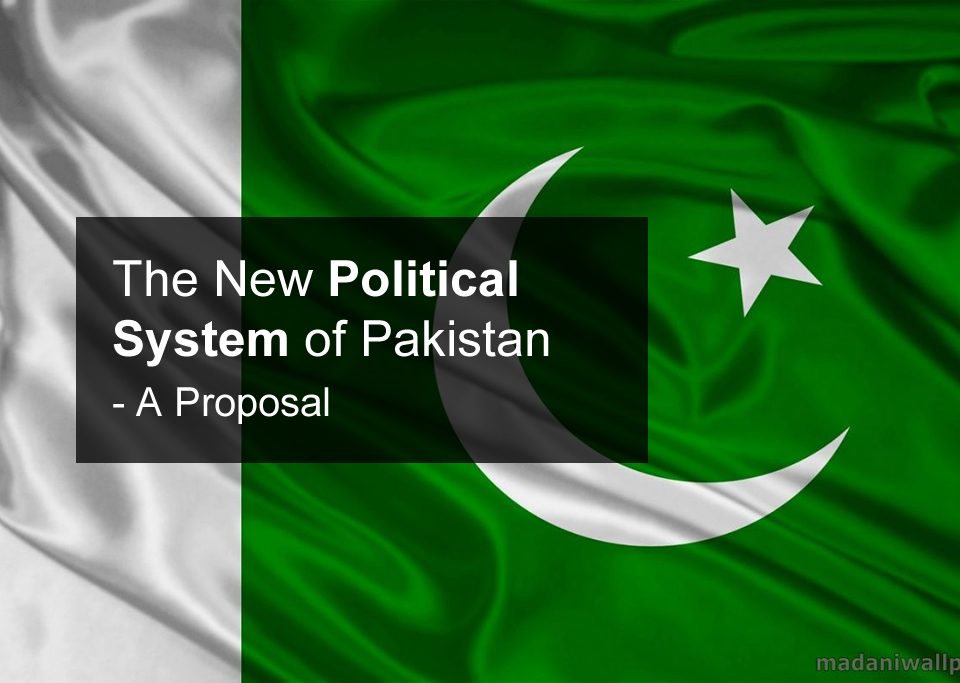Fatwā – Islamic Democratic and Political System
Fatwā - Islamic Democratic and Political System
Imran Ahsan Khan Nyazee
بِسْمِ اللَّهِ الرَّحْمَٰنِ الرَّحِيمِ
In the Name of God, Most Merciful and Compassionate,
and (with) prayers and blessings on Muḥammad and his family.
Contents
- 1 The Question
- 2 The Nature of This Fatwā
- 3 The Issues Raised
- 4 The Power Centers and Political Reality
- 5 Allocating Votes
- 6 Those to be Elected and Their Powers
- 7 The Guiding Principles for All
- 8 Dealing With Corruption
1 The Question
Many claims are made by jurists and scholars that Islam has its own form of democracy and political system; but when it comes to practical implementation there is very little to rely on. It is also claimed that Islam has its own system of distributive and social justice. In the light of such claims, what form will the Islamic democratic system have in the present times, and what political structures will be implemented? A ruling is required within the context of the current democratic and political system prevailing in Pakistan.
2 The Nature of This Fatwā
It is impossible to issue a fatwā that covers the entire democratic and political system to be implemented in a country. All that can be done is to identify a few basic and vital principles. Once these principles are identified, proposals can be made as to how these principles are to be converted into actionable plans. These plans can then be debated, altered, improved and finalized. Accordingly, the issues listed below are to be seen as those dealing with some basic principles and those providing a basis for formulating proposals. In all these issues and proposals, Pakistan will be used as the target model.
3 The Issues Raised
The issues with respect to principles are as follows:
- Whether the principle of “one person one vote” has an Islamic basis.
- If the principle of “one person one vote” is not acknowledged as Islamic, what other principle can be identified that will govern voting.
- Whether the principles identified above can be linked to the Islamic form of distributive and social justice.
The issues pertaining to proposals are listed below:
- In the light of the political principles settled (above), how will the people vote?
- What structures are contemplated for the different organs of the state?
- What will be the Islamic guiding principles for all levels of government?
- What provisions are to be made for those found guilty of corruption?
We will consider the issues dealing with principles together in the next section and thereafter follow it up with proposals in the remaining sections.
4 The Power Centers and Political Reality
The authority to cast a vote is not a right, but a political power. It is the power to effect change. A person who has the greatest number of votes behind him has the greatest power in a country. It is customary to use the word “right” to mean a number of things. This has been demonstrated so ably by legal philosophers and jurists, with the finishing touches given by Wesley N. Hohfeld. He elaborated that the word “right” actually means four things: claim, power, liberty and immunity. The true sense of right as we understand it is conveyed by the word “claim.” This shows that a right is something claimed from another. Thus, I am at liberty to go out for a walk or to wear a hat or to smoke, but it will not make sense to say it is a right, because I am not claiming it from another. The word “power,” with which we are really concerned here, is also not a right in the sense of a claim. At a minimum, it is the authority to alter the status of another. Thus, I have the right to appoint another person as my agent (wakīl). This alters his status and he acquires certain rights and duties due to the power that I have exercised. Casting a vote is a similar exercise of power. In fact, it amounts to the appointment of an agent, a representative, to whom you delegate your authority as a citizen to bring about change or to manage affairs.
In Islamic law, this is exactly the sense in which such power or authority is exercised. It is reflected in the contract of bay‘ah by means of which a Muslim authorizes another to manage, on his behalf, the affairs of a country or land. Muslim jurists have declared the contract of bay‘ah to be the contract of agency.
Throughout Islamic history, Muslim jurists have recognized this power of appointing the ruler and bringing about change. It has sometimes been expressed under the principle of tribal solidarity (‘aṣabiyyah) by Ibn Khaldūn, as the power of the ahl al-ḥall wa-al-‘aqd, and then openly as the principle of shawkah (power). Even Ibn Taymiyyah did not give up this principle. Here is what we wrote about him in our book called Theories of Islamic Law:
He retained the principle of shawkah (coercive power) as it had been developed by al-Ghazālī, along with the concept of mubāya‘ah.1 Al-Ghazālī had explained that the purpose of shawkah was to gauge public opinion as a large number of divergent opinions were gathered in one person possessing shawkah by virtue of his following. He says in his al-Iqtiṣād: “The purpose is that a large number of divergent opinions be gathered in one person commanding obedience, and the imām comes to command obedience …through the mubāya‘ah of this person.”2 Ibn Taymiyyah turned down the idea of the imām being from the tribe of Quraysh, considering it as valid only for the period immediately following the death of the Prophet (pbuh).3 As for the relationship that exists between the ruler and the subjects, it is not only that of principal and agent (wakīl), but the imām is also the walī (guardian) and sharīk (partner) of his subjects.4
The ruler then is appointed through power or shawkah whose purpose is to gather diverging opinions and make them focus on the appointment of the ruler. The legal form through which this power is exercised is the contract of agency called bay‘ah. Thus, it is a power and not a claim or right.
There is no equality in power. People possess power in different ways and are unequal in this respect. The Noble Qur’ān says: “Allah sets forth the Parable (of two men: one) a slave under the dominion of another; He has no power of any sort; and (the other) a man on whom We have bestowed goodly favors from Ourselves, and he spends thereof (freely), privately and publicly: are the two equal? (By no means;) praise be to Allah. But most of them know not.”5 The verse tells us that in terms of power, people are not equal. In this particular case, the basis of power is wealth. Power was once associated with military power or coercive power, but even then the basis for such power was wealth; whoever had wealth could gather military power around him. Today, power has come to be associated with the possession of wealth. Whoever denies this is denying a fundamental reality, which the Muslim jurists were truthful enough to recognize. In the current democratic systems, this fundamental truth is denied by giving one person one vote. The result is that those with wealth start playing havoc with the system through lobbying or other well-known means, and the whole system often appears to be a farce.
Allah Almighty has not considered the mere possession of power to be enough. The Qur’ān says: “Not equal are those believers who sit, except those who are disabled, and those who strive and fight in the cause of Allah with their goods and their persons. Allah hath granted a grade higher to those who strive and fight with their goods and persons than to those who sit (at home). Unto all (in faith) Hath Allah promised good: But those who strive and fight Hath He distinguished above those who sit (at home) by a great reward.”6 And again, “Those who believe, and emigrate and strive with might and main, in Allah’s Cause, with their goods and their persons, have the highest rank in the sight of Allah. They are the people who will achieve (salvation).”7
The condition then is that power is not to be exercised in a ruthless manner, rather it is to be exercised through one’s goods and persons. In other words, wealth is to be used in the cause of Allah for it is a power that Allah has bestowed on some. Not many people will use their goods and wealth for the cause of Allah. The Qur’ān says: “Allah has bestowed His gifts of sustenance more freely on some of you than on others: those more favored are not going to throw back their gifts to those whom their right hands possess, so as to be equal in that respect. Will they then deny the favors of Allah?”8 The people with wealth, and consequent power, must, therefore, be provided with incentives that encourage them to use their wealth for the greater good.
The incentives to be provided to those with wealth must have as their goal the securing of the distributive and social justice system of Islam. In addition to this, the system must find ways to accord greater respect to such persons provided they are contributing their wealth to the system or are striving in the cause of Allah with their wealth. In the early days of the British Empire, the power of casting votes was linked to landed property. It was also linked to certain honours like being appointed a member of the jury.
The power to cast votes on the basis of wealth contributed does in no way mean a superior right to be elected or appointed to office. The right to office is a right and not a power, therefore, everyone is equal in this respect whether he is very poor or very rich. The Qur’ān indicates this too: “Their Prophet said to them: ‘Allah hath appointed Talut as king over you.’ They said: ‘How can he exercise authority over us when we are better fitted than he to exercise authority, and he is not even gifted with wealth in abundance?’ He said: ‘Allah hath chosen him above you, and hath gifted him abundantly with knowledge and bodily prowess: Allah Granteth His authority to whom He pleaseth. Allah is All-Embracing, and He knoweth all things.’ ”9
5 Allocating Votes
The principles have been settled above and what follows in the remaining sections are proposals. There are two main goals of these proposals: (1) To set up an efficient political system; and (2) To build the Islamic system of distributive justice into the political system.
Votes are to be allocated on a scale of 1 to 50, as follows:
- The first slab is that of persons who pay zakāt. A person who has paid the highest amount of zakāt will be entitled to 50 votes. A person who has paid the minimum amount of zakāt will be entitled to 31 votes. The calculation of zakāt will be based on the average amount of the five years prior to elections. As zakāt rreturns will be included within the tax returns to be filed, the calculation of the number of votes to which a payee is entitled will just be a matter of programming the software.
- The second slab will be those of taxpayers. A person who has paid the highest amount of taxes will be entitled to 30 votes. A person who has paid the minimum amount of taxes will be entitled to 11 votes. The calculation of taxes, again, will be based on the average amount of the five years prior to elections. Entitlements will be programmed into the software to be used by the Federal Board of Revenue.
- The third slab will be based on education. A person with the highest educational qualifications will be entitled to 10 votes, that is, if he is not paying any zakāt or taxes. One with the lowest qualifcations will be entitled to 2 votes.
- The person who is illiterate, and does not pay any zakāt or taxes, will be entitled to one vote.
6 Those to be Elected and Their Powers
The British Parliamentary model or the American Presidential model will not be followed. The following will be elected at the Federal level.
- President: To be elected in a general direct nationwide election. President will have the power to overrule or approve all decisions of the Ministers/Secretaries, but in practice he will overrule or approve major projects and contracts. He will be the head of state and the head of the executive. He will appoint the commander of the armed forces, the heads of automomous institutions and the heads of government companies and corporations. He will have the complete authority to terminate the services of all those he can appoint.
- Ministers/Secretaries: Ministers, who will also be the secretaries and principal accounting officers of their respective ministries, will be elected along with the President. They will have the complete authority to hire and fire people in their ministries. The rest of the officials of the ministries will be professional officers.
- Lawmakers: Each district will elect one member of the legislative assembly to be called the Majlis. The Majlis will make all laws, approve and sanction the budget as well as new taxes, and will be able to question the ministries and other institutions to ensure that funds are being utlized efficiently. It will also give advice to the President in its Shura jurisdiction, when asked by the President to do so. If there are 143 districts, the strength of the Majlis will be 143, but additional seats may be provided for women and minorities. The lawmakers will not be allocated any funds for their districts nor will they have anything to do with the management of the district; all they can do is voice the concerns of their district in the Majlis. There will be only one House.
- Judges of the Supreme Court: Ten judges of the Supreme court will be elected through a nationwide election, along with the President. The Supreme Court will take up questions of law alone, and will also have the power of judicial review of laws and administrative actions. The procedure at the Supreme Court will be adversarial, to be implemented with lawyers representing parties.
Provinces to be abolished; the District will be an autonomous administrative unit. All sales taxes will be levied at the level of the district alone. The district may also levy duties on goods imported or exported by the district. The following persons will be elected.
- The lawmaker of each district as described above.
- The Mayor: He will be responsible for the administration and management of his district. The district police will be under his control. He will have the full authority to hire and fire officials in his district, other than the judges/qāḍīs.
- Bench of District Judges: Two, or maximum three, judges will be elected by the district. They will hear all cases as a bench with the powers of the current High Courts, which will be abolished along with the provinces. The bench will hear appeals arising from the Tehsil or Ilaqa Qāḍī. Appeals arising from the benches, involving points of law, will be heard by the Federal Supreme Court. All other matters will be deemed finally settled at the level of the district. The Tehsil or Ilaqa Qāḍī will hear appeals arising from the court of the local or Union Council Qāḍī. The procedure at the Union Council will be inquisitorial to be implemented by the Qāḍī with the help of a police station or sub-police station housed adjacent to the court. This means no lawyers will be involved at this level. This qāḍī will record plaints/complaints in his own hand and initiate the process if required, issuing swift judgments. The two higher levels of courts will adopt the adversarial system with the help of lawyers. The judges of the Ilaqa and local level will belong to the regular judicial service implemented by the Federation.
7 The Guiding Principles for All
All judges, members of the legislature and executive, as well as professionals employed by the autonomous bodies will be guided in general terms by the maqāṣid al-sharī‘ah. See our book Uṣūl al-Fiqh for the New Millennium: Closing of the Gates of Ijtihād and Activating Takhrīj, which is Book 3 of the LexIslamica Series and will be coming out soon.
8 Dealing With Corruption
The death penalty must be provided for corruption exceeding a certain limit. The punishment is to be scaled down for lesser amounts. This will be done under the siyāsah jurisdiction of the Imam.
Allah knows best.
Rabi‘ al-Awwal 25, 1434
February 6, 2013



